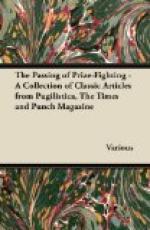The liftmen who from time to time ascended
To spill their loads (in which
you had no part)
Regarded me with eagle eyes intended
To lay the touch of terror
on my heart;
But through a wait thus perilously dreary
My spirits drooped not nor
my courage flinched;
“She cometh not,” I merely
sighed, “I’m weary
And likely to be pinched.”
You came at last, long last, to end my
fretting,
And now you know how your
devoted bard
Faced for your sake the risk of fine or
getting
An unaccustomed dose of labour
(hard);
Harbour no more that idiotic notion
That love to-day is unromantic,
flat;
Gave Lancelot such a proof of his
devotion,
Did Galahad do that?
* * * * *
PAMELA’S ALPHABET.
Scene.—A DOMESTIC INTERIOR.
Pamela’s father, in one armchair, is making a praiseworthy effort to absorb an article in a review on “The Future of British Finance.” In another armchair Pamela’s mother is doing some sort of mending. Pamela herself, stretched upon the hearthrug, is reading aloud interesting extracts from a picture-book.
Pamela (in a cheerful sing-song). A for Donkey; B for Dicky.
Her Father. What sort of dicky?
Pamela (examining the illustration more closely). All ugly black, bissect for his blue mouf.
Her Mother (instructively). Not blue; yellow. And it’s a beak, not a mouth.
Pamela. I calls it a mouf. He’s eating wiv it. (With increasing disfavour) A poor little worm he’s eating. Don’t like him; he’s crool. (She turns the page hurriedly and continues) C for Pussy; D for Mick.
[This is the name of the family mongrel. That the picture represents an absolutely thoroughbred collie matters nothing to Pamela. She spends some time in admiring Mick, then rapidly sweeps over certain illustrations that fail to attract.
Pamela (stopping at the sight of a web-footed fowl, triumphantly). G for Quack-quack.
Her Father. Oh, come, Pamela, that’s not a quack-quack; that’s a goose. It makes quite a different noise.
[Anticipating an immediate
demand for a goose’s noise he clears
his throat nervously.
Pamela (with authority). This one isn’t making any noise. It’s jus’ thinking. (Her father accepts the correction and swallows again.) H for Gee-gee. Stupid gee-gee.
Her Father. Why stupid?
Pamela. ’Acos its tail looks silly.
Her Father (glancing at the tail, which bears some resemblance to an osprey’s feather). You’re right; it does.
Her Mother. I wonder whether it’s wrong to let children get accustomed to bad drawings?




